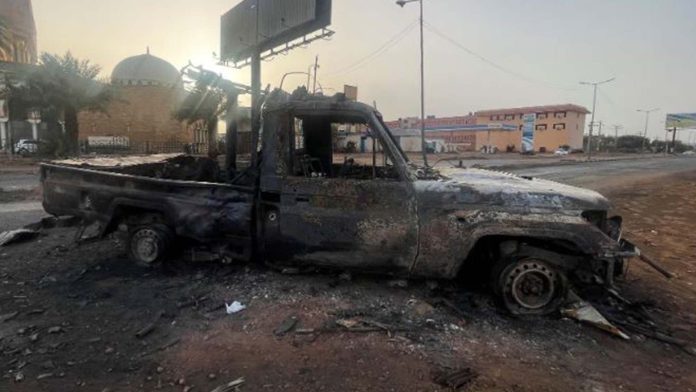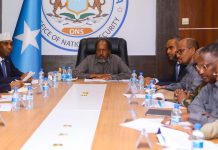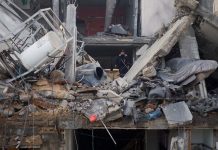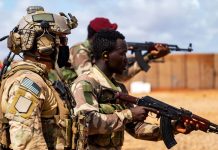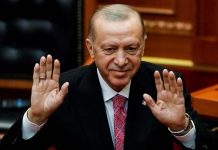Sudan’s army and a paramilitary force battled on Khartoum’s outskirts on Wednesday, undermining a truce in their 11-day conflict, but the army expressed willingness to extend the ceasefire.
The army late on Wednesday said its leader, General Abdel Fattah al-Burhan, gave initial approval to a plan to extend the truce for another 72 hours and send an army envoy to the South Sudan capital, Juba, for talks.
The Sudanese armed forces and the paramilitary Rapid Support Forces (RSF) previously agreed to a three-day ceasefire that was due to expire late on Thursday. There was no immediate response from the RSF to the proposal from the Intergovernmental Authority on Development (IGAD), a regional bloc.
The military said the presidents of South Sudan, Kenya and Djibouti worked on a proposal that includes extending the truce and talks between the two forces.
“Burhan thanked the IGAD and expressed an initial approval to that,” the army statement said.
U.S. Secretary of State Antony Blinken and African Union Commission Chairperson Moussa Faki Mahamat discussed working together to create a sustainable end to the fighting, the State Department said in a statement on Wednesday.
Some of Wednesday’s heaviest battles were in Omdurman, a city adjoining Khartoum where the army was fighting RSF reinforcements from other regions of Sudan, a Reuters reporter said. Heavy gunfire and airstrikes could be heard into the evening.
In Khartoum, which together with two bordering cities is one of Africa’s largest urban areas, gangs marauded and there was widespread looting.
Since fighting erupted on April 15, air strikes and artillery have killed at least 512 people, wounded nearly 4,200, destroyed hospitals and limited food distribution in the vast nation where a third of the 46 million people were already reliant on humanitarian aid.
MALNOURISHED CHILDREN
The World Health Organization said only 16% of health facilities were functioning in Khartoum and predicted “many more deaths” due to disease and shortages of food, water and medical services including immunization.
An estimated 50,000 acutely malnourished children have had treatment disrupted due to the conflict, and those hospitals still functioning are facing shortages of medical supplies, power and water, according to a U.N. update on Wednesday.
Deadly clashes broke out in Geneina in West Darfur on Tuesday and Wednesday resulting in looting and civilian deaths and raising concerns about an escalation of ethnic tensions, the update said.
The crisis has sent growing numbers of refugees across Sudan’s borders, with the U.N. refugee agency estimating 270,000 people could flee into South Sudan and Chad alone.
Foreigners evacuated from Khartoum have described bodies littering streets, buildings on fire, residential areas turned into battlefields and youths roaming with large knives.
The White House said a second American had died in Sudan.
“It was horrible,” said Thanassis Pagoulatos, the 80-year-old Greek owner of the Acropole Hotel in Khartoum, after arriving in Athens to the embrace of emotional relatives.
“It has been more than 10 days without any electricity, without water, and five days nearly without food,” he added, describing shooting and bombing. “Really, the people are suffering, the Sudanese people.”
FORMER DICTATOR LEAVES PRISON
Beyond the humanitarian crisis, civilian groups fear the violence will enable the military to tighten its grip and revive the sway of an ousted autocrat’s loyalists.
The army said Omar al-Bashir, the 79-year-old former dictator toppled in 2019, had been transferred from Khartoum’s Kober prison to a military hospital, along with at least five of his former officials, before hostilities started.
Over the weekend, thousands of inmates were freed outright from prison, including a former minister in Bashir’s government who, like him, is wanted on war crimes charges by the International Criminal Court in The Hague.
Bashir’s three-decade reign came to an end with a popular uprising four years ago. He has been in prison, with spells in hospital, on Sudanese charges related to the 1989 coup that brought him to power.
“This war, which is ignited by the ousted regime, will lead the country to collapse,” said Sudan’s Forces of Freedom and Change (FCC), a political grouping leading an internationally backed plan to transfer to civilian rule.
The plan was derailed by the eruption of fighting between the regular army and the paramilitary Rapid Support Forces (RSF). The two sides and the FCC missed an April deadline to launch the transition to democracy, largely over disputes about merging the security forces.
Civilian groups have blamed groups loyal to Bashir of seeking to use conflict to find a way back to power. The RSF, whose leader General Mohamed Hamdan Dagalo rose to power under Bashir but later dumped him, has strongly opposed the Islamists who backed the former army autocrat.
Sudan’s army took over in a coup two years after the toppling of Bashir. The whereabouts of Bashir came into question after a former minister in his government, Ali Haroun, announced he had left Kober prison with other former officials.
The ICC in The Hague has accused Bashir of genocide, and Haroun of organising militias to attack civilians in Darfur in 2003 and 2004. It declined to comment on the situation.
Reporting by Mehmet Emin Caliskan, Omer Berberoglu, Deniz Uyar in Istanbul and Michelle Nichols in New York and Tala Ramadan in Dubai; Writing by Michael Georgy; Editing by Simon Cameron-Moore

